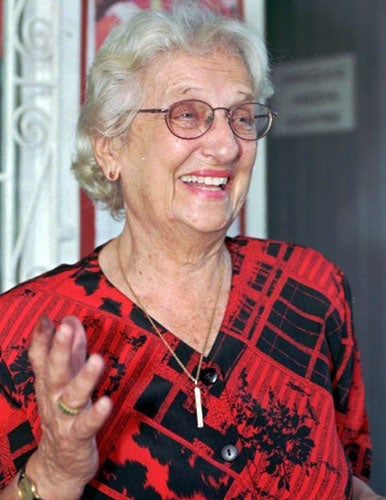Janet Jagan: Marxist from Chicago who served as president of Guyana

Janet Jagan was white, Jewish and from Chicago, but for two years she served as President of Guyana, a Caribbean country on the mainland of South America deeply divided between communities of Indian and African origin. She was training as a nurse in her home town when she met Cheddi Jagan, a dental student whose parents had been brought from India as indentured labourers to work on a sugar plantation in what was then British Guiana, and the future course of her life was set.
The couple married in August 1943, and Janet is generally held to have exercised a decisive influence on her husband's political development, steering him towards the Marxist left. But she always dismissed as a racist myth, put about by the British, any suggestion that she was the real driving force behind Cheddi Jagan's career, which eventually took him to the leadership of his country.
Janet Rosalie Rosenberg was born into a middle-class family in Chicago in 1920. She attended several universities, dabbling in physics and bacteriology, before enrolling in the Cook County School of Nursing – but she did not complete that course, either. The politics of British Guiana/Guyana was to become her overriding interest.
The young couple moved to Cheddi Jagan's homeland in December 1943, to the dismay of Janet's parents, and for the next 10 years she worked as a dental nurse in her husband's clinic. At the same time they both became deeply involved in left-wing political and union activities, joining the colony's first-ever trade union and founding the Political Affairs Committee, which in 1950 became the People's Progressive Party (PPP), uniting the "East Indian" and black communities in the demand for independence from Britain. Janet Jagan served as PPP general secretary without a break until 1970.
In 1950 she became the first woman to be elected to Georgetown city council, and three years later she was one of the first three women to win a parliamentary seat, as member for Essequibo, when the PPP won the first elections held under universal adult suffrage. But this was at the height of the Cold War, and the colonial power was unnerved by the Jagans' radicalism. Prompted by a nervous US administration, London suspended the constitution in October 1953 and dismissed the government, on the grounds that the country was in danger of falling into Communist hands.
Janet Jagan was jailed for six months in 1954, on civil disobedience charges, and was confined to the Georgetown area for two years after her release. This meant she was unable to return to Chicago to visit her dying father. After the PPP was returned to office in the 1957 elections, and she resumed her Essequibo seat, she served as minister of labour, health and housing, and later home affairs.
But by that time the PPP had split along racial lines, and one of the party's founders, Forbes Burnham, a London-trained black barrister, led a breakaway to form the People's National Congress (PNC). Ethnic political divisions continue in Guyana to this day.
The PNC, with discreet backing from Britain, took the colony to independence in 1966, and the PPP was firmly excluded from power until 1992. The PNC rigged election after election, and turned the country into a virtually one-party "cooperative republic", with Burnham serving as executive President from 1980. But the Jagans' political will never wavered, and Janet turned her formidable energies to everything from organising female domestic workers to editing the PPP's publications, the Mirror newspaper and the quarterly Thunder – a post she still held at the time of her death. She was a PPP member of Parliament from 1973 to 1997.
In 1992 Cheddi Jagan finally achieved his lifelong ambition to become President of Guyana, in what were arguably the country's first free elections since independence. But it was a very different world by then. Jagan decided to continue the free-market policies introduced by his PNC predecessor, Desmond Hoyte (Burnham had died in 1985), and Guyana enjoyed a high growth rate for most of the 1990s. Janet Jagan had a pragmatic explanation for this policy reversal. "We faced the realities and decided our job was to create a national state based on democracy and the improvement of peoples' lives."
On the death of her husband in March 1997, Janet Jagan honoured his last wish and took over as Prime Minister and first Vice-President. She then led the PPP-Civic alliance to victory in the general elections of 1997, becoming the first democratically elected female president in South America at the age of 77.
The 1997 elections were highly controversial, and the disgruntled PNC opposition, alleging massive fraud, attempted unsuccessfully to prevent her from being sworn in. Her years in office were marked by continuing political unrest, including a long strike by public-sector workers that almost brought the country to its knees. In August 1999, after she had suffered a mild heart attack, President Jagan resigned, and was replaced by her former finance minister, Bharrat Jagdeo.
In her later years "Comrade Janet" wrote children's stories, including When Grandpa Cheddi was a Boy (1993), Patricia, the Baby Manatee (1995) and Anastasia the Ant-Eater (1997). She also became a noted patron of the arts, helping to found the National Art Gallery in Georgetown.
Colin Harding
Janet Rosalie Rosenberg, politician: born Chicago 20 October 1920; married 1943 Cheddi Jagan (one son, one daughter); President of Guyana 1997-99; died Georgetown, Guyana 28 March 2009.
Subscribe to Independent Premium to bookmark this article
Want to bookmark your favourite articles and stories to read or reference later? Start your Independent Premium subscription today.

Join our commenting forum
Join thought-provoking conversations, follow other Independent readers and see their replies